Academic Partner – New Delhi, India
South Asian University
South Asian University (SAU) is an international university sponsored by the eight Member States of the South Asian Association for Regional Cooperation (SAARC). At the 13th SAARC Summit held in Dhaka in November 2005, Indian Prime Minister Manmohan Singh proposed the establishment of a South Asian University to provide world-class facilities and professional faculty to students and researchers from SAARC member countries. The university started admitting students in 2010 at a temporary campus at Akbar Bhawan, India. Since February 2023, the University is running on its permanent campus at Maidan Garhi in South Delhi, India.
SAU’s work with BIG Lab
The Third South Asian Border Studies Conference, a resounding success, was held in April 7-19th, 2023 at Banaras Hindu University, one of the ancient centres of learning. The Indian Council of Social Science Research (ICSSR) also supported this conference.
SAU is currently in the process of finalising the paper for an edited volume (editors: Vaishali Raghuvanshi, Emmanuel Brunet—Jailly, and Dhananjay Tripathi). They have also proposed a special issue of BIG_Review (Editors: Vaishali and Dhananjay) and are waiting for the participants’ final submissions of papers.

BIG Talk — What happens when closed borders reopen? Learning from a Central Asian example
with Dr. Nick Megoran (Visiting Fellow, Borders in Globalization) | Victoria, BC & Zoom | March 26, 2024
In Person: CFGS C168 (Sedgewick Building, University of Victoria) or Zoom. The meeting will take place from 12:00pm to 1:30pm PST. Register in advance for this meeting here. Registration is free but required.
Much recent work in border studies has focussed on the violence of border closures. In an age of right-wing populism and xenophobia this is important but reflects western-centric preoccupations. There are other processes taking place in other parts of the world that sometimes get missed. This paper tells one of them, based on over 25 years conducting fieldwork in a village on the Kyrgyzstan–Uzbekistan boundary. Dissected by new boundaries and borders in the late 1990s and early 2000s, with a change of political leadership since 2016 a gradual reopening of previously-closed crossings has occurred. This has happened without any of the damaging consequences that the politicians who closed the borders in the first place warned of. This seminar presents this story and asks what it says about our understanding of processes in an increasingly-bordered today.
Nick Megoran is a Visiting Fellow working with the Borders in Globalization program and the Centre for Global Studies and Professor of Political Geography at Newcastle University. His work focuses on nationalism and border dynamics in the Danish–German and Uzbek–Kyrgyz borderlands, which he has been researching for three decades. He has authored numerous articles and books on this topic, including Nationalism in Central Asia: A Biography of the Uzbekistan-Kyrgyzstan Boundary (Pittsburgh 2017).
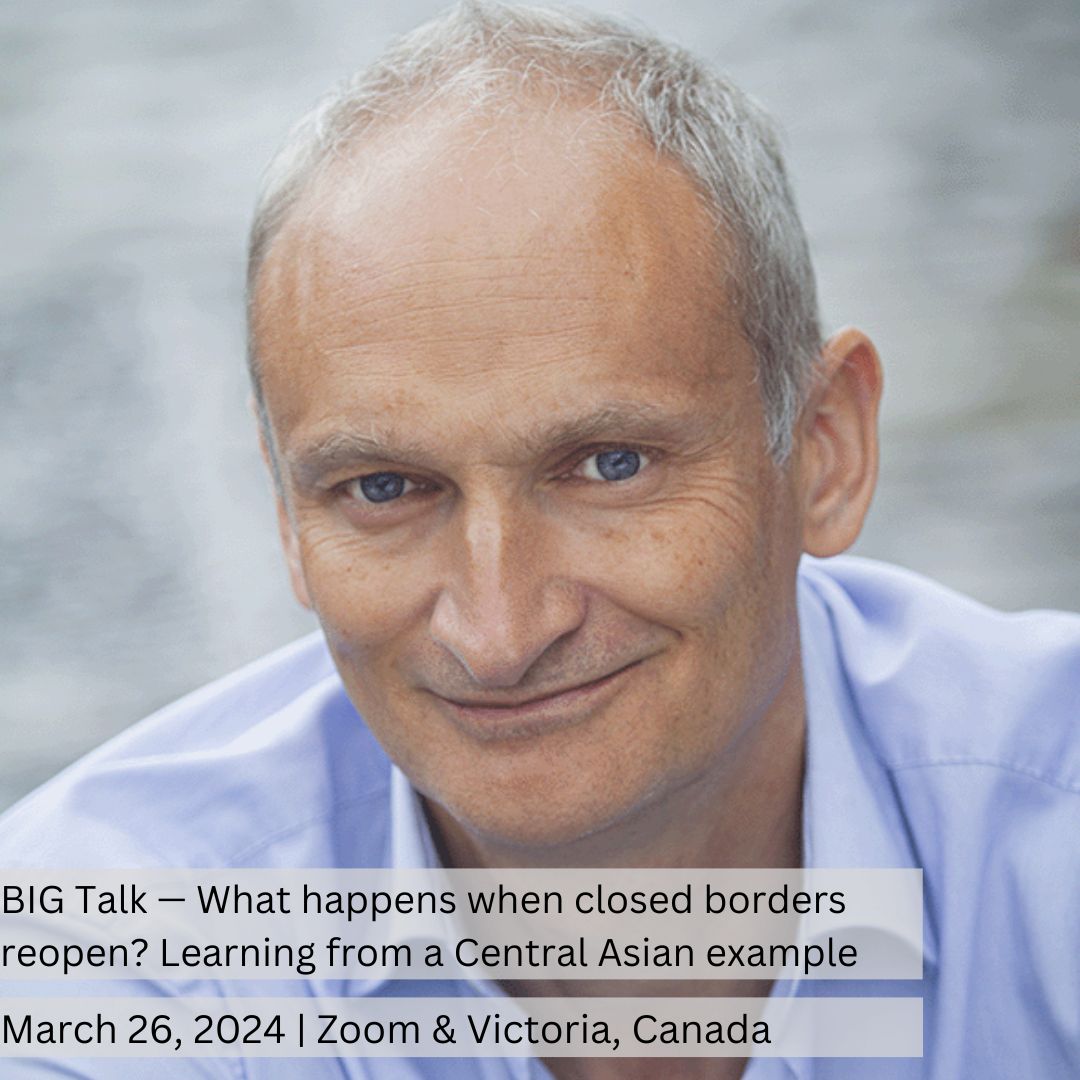
BIG Talk – Cross border women trafficking in the east of South Asia: Marginality, precarity and legality
with Anasua Basu Ray Chaudhury (Senior Fellow, Observer Research Foundation, Kolkata) | Victoria, BC & Zoom | July 17, 2023
In Person: CFGS C168 (Sedgewick building, University of Victoria) or Zoom. The meeting will take place from 11:00AM to 12:30PM PST. Register in advance for this meeting here. Registration is free but required.
In the contemporary globalized world, trafficking of women and children and their undocumented migration have increased in both magnitude and reach, thus becoming a major human rights concern. The recent publication of the United Nations Office on Drugs and Crime (UNODC) entitled Global Report on Trafficking in Persons 2022 reveals that women account for the largest share of trafficking victims (43 per cent) of the total detected trafficked persons in South Asia. In terms of shares of detected trafficked persons in South Asia, by area of citizenship (2022) accounts for 99 percent domestic while 1 percent across border. The clandestine nature of the crime makes it difficult to gather accurate data on the number of victims. However, government and non-government reports emphasize the serious nature of the crime. The routes, methods and activities of traffickers are increasingly more organized and there is a greater penetration of organized crime syndicates into trade and trafficking of women and children within and from outside the region. While several laws in South Asian countries aim to combat human trafficking, the response level of criminal justice appears to be limited. An effective remedy must include recovery assistance, safe repatriation, reintegration, and access to information for the victims, along with appropriate legal measures to bridge existing gaps in addressing human trafficking concerns. Against this backdrop, the deliberation seeks to assess the current situation of women trafficking in the eastern part of South Asia encompassing the adjacent area of India, Bangladesh, and Nepal- the epicenter of this transnational organized crime. How is trafficking related to forced migration? What makes women and fall vulnerable to trafficking? What are the reasons for insignificant legal integration of human rights, gender and child rights in domestic anti-trafficking laws and policies in South Asia? How to strengthen cross border understanding to combat women trafficking? These are a few questions that the presentation intends to ponder upon.
Anasua Basu Ray Chaudhury, Ph.D in International Relations, is a Senior Fellow with the Neighbourhood Initiatives, Observer Research Foundation, Kolkata chapter. She is the Editor, ORF Bangla. She specialises in regional and sub-regional cooperation in South Asia, the Bay of Bengal region and the Indo-Pacific, energy forced migration and women in conflict zones. She was the coordinator of the research programme entitled “Proximity to Connectivity” and supervised/authored/co-authored a series of extensive field based reports related to connectivity and dynamics of cross border cooperative architectures. She is also the recipient of the Public Service Broadcasting Trust Senior Media Fellowship (Prasar Bharati,2007) and the Kodikara Award (Regional Centre for Strategic Studies, Colombo, 1998–99). She was the Visiting Fellow (2012) at The Maison des Sciences de I’Homme, Paris. She is a member of the Editorial Board of international peer reviewed journals namely Borders in Globalization Review (Centre for Global Studies, Canada) and Journal for Indian Ocean Research (Routledge, New Delhi).
Her recent publications include Caste and Partition in Bengal: The story of Dalit refugees,1946-61 (OUP, UK, 2022); BIMSTEC: Mapping Sub-regionalism in Asia (Co-edited Routledge:UK, 2022); New futures of BIMSTEC: connectivity, commerce and security (co-edited Routledge: UK, 2021), India– Myanmar Borderlands: Ethnicity, Security and Connectivity (co-edited/ Routledge, UK, 2020); Connecting Nations: India and Southeast Asia (coedited/ Primus, New Delhi, 2019); The State of Being Stateless in South Asia (co-edited/ Orient Black Swan: New Delhi, 2015); Women in Indian Borderlands (co-edited/ Sage Publications, New Delhi, 2011).
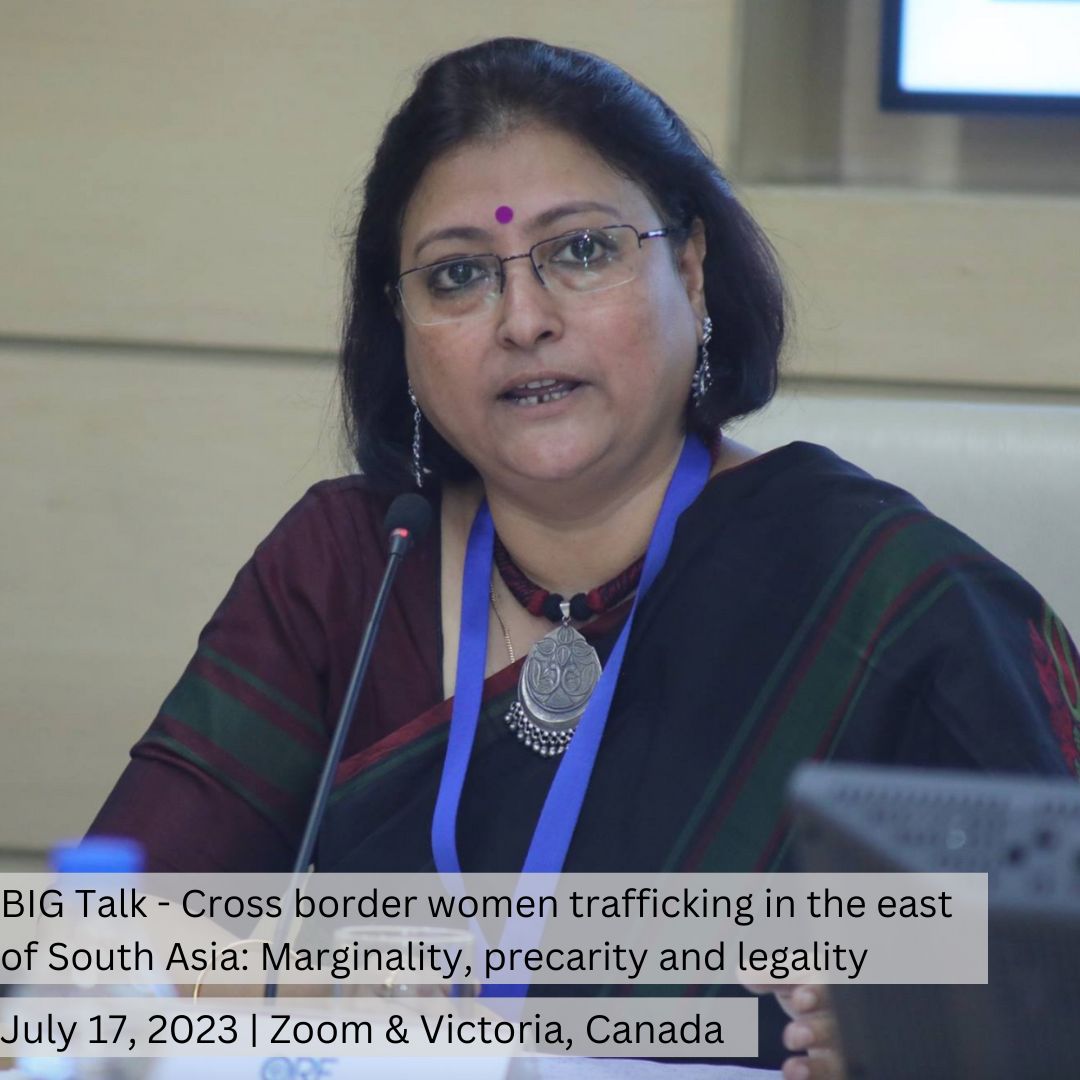
Talk by Prof. Emmanuel Brunet-Jailly on EU – BREXIT – what new borders mean for UK and EU
Thanks to the British Exit (Brexit) the European Union member states are faced with a new and important development in the history of the construction of the European Union. This talk discussed the origins and developments of the BREXIT in the UK and the European Union and its most recent developments; in particular, focusing on border issues in Northern Ireland and the rest of the United Kingdom – what new borders mean for the UK and its relationship with the EU. Speakers: Britta Petersen, Senior Fellow ORF Prof. Emmanuel Brunet-Jailly, University of Victoria (Canada) Alex Pykett, British High Commission, New Delhi
Beyond Boundaries and Borders: South Asian Quest for Peace, Development and Regional Connectivity
Mumbai, India | March 1-2, 2019
South Asia is one of the fastest growing regions that exhibit a potential to emerge as a leading economic centre of the world. Nevertheless, South Asia is riddled with inter and intraregional conflicts embedded in ethnicity, religion, border disputes, and resource politics. These conflicts act as an impediment to peace, development and regional cooperation. In the post-1990’s economic restructuring (liberalisation and privatisation) paved the way for economic growth in the region. Not only India but other South Asian countries Like Nepal and Bangladesh recently earned a reputation of moving swiftly on the path of economic growth. It is a region, nascent in development and growth trajectory and all these are in favour of South Asia. It is expected that in the next couple of years both Nepal and Bangladesh will graduate from the category of the Least Developing Country (LDC) to Developing Country. At the same time, India with its newly acquired economic strength now transited from aid recipient to a donor country. While these are positive indications for a post-colonial region but some issues require serious academic deliberations. The foremost is the question of lack of peace, stability, development and regional integration that is also related to dismal connectivity and lack of cross-border mobility management/governance in South Asia. This is related to the fact that South Asian economies remained open to globalisation, but the same enthusiasm is missing for regional cooperation. Therefore the benefits associated with regional integration are still to be reaped. In short, South Asia is a region of hope and despair and the realisation of potentialities and overcoming the challenges largely depends on the prospect of peace, stability and regional cooperation/ integration.
The conference was organized by the Department of Civics and Politics (University of Mumbai, Mumbai), the Department of International Relations (South Asia University, New Delhi), the Center of Statelessness and Refugee Studies (School of Law, Rights and Constitutional Governance, Tata Institute of Social Sciences, Mumbai), and Nehru Memorial Museum and Library (New Delhi).
.
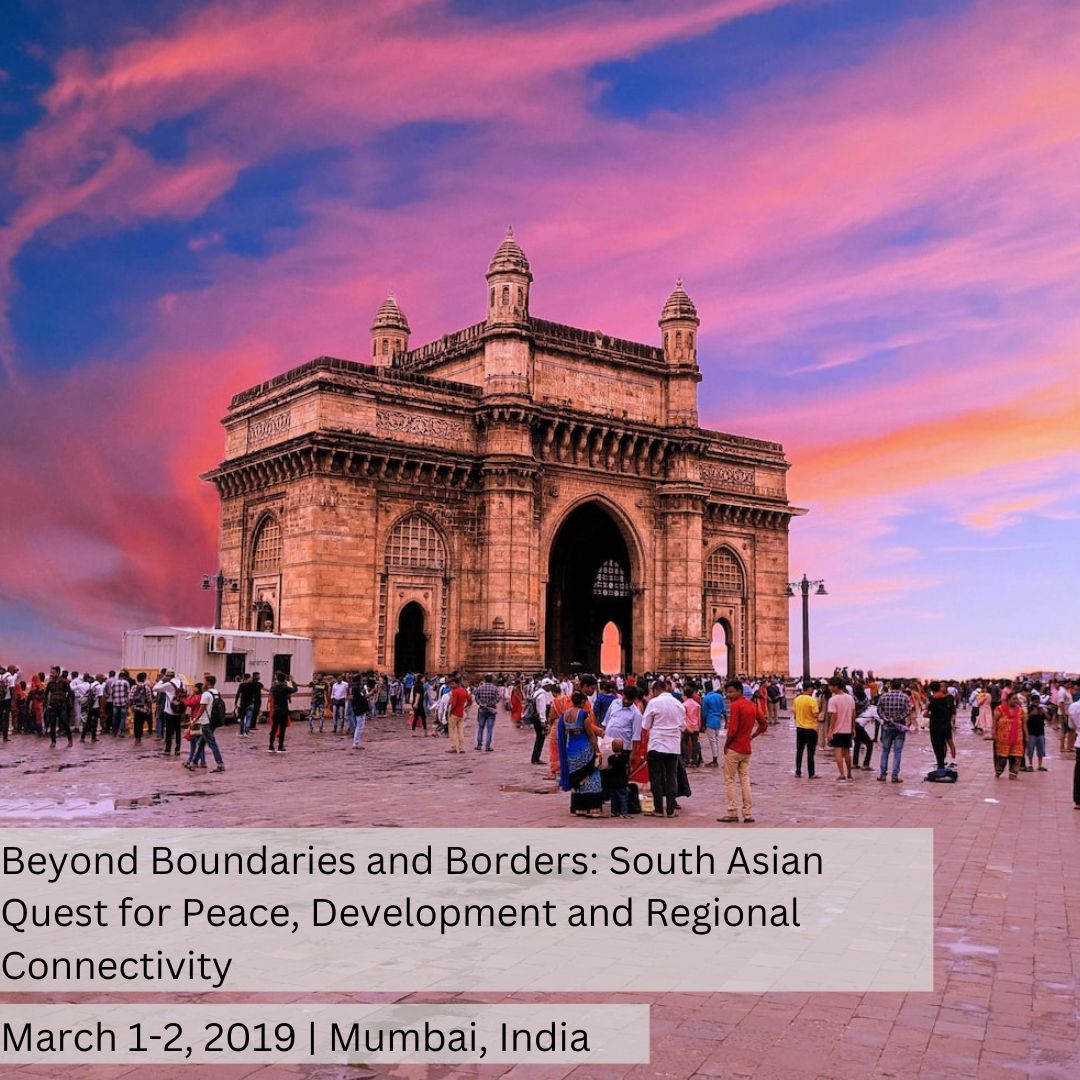
Workshop: Borders and Regionalism in South Asia
New Delhi, India | August 25, 2018
South Asia is regarded as one of the least integrated regions of the world. This is despite the fact that the region shares a common history, culture and developmental challenges. Indeed, some hard borders and boundaries act as hurdles for regional integration in South Asia. Contrary to this dominant representation of the region, other realities are quite often ignored. One such important aspect is the socio-cultural and historical ties that exist among the people of the region. Thus, while acknowledging the official borders, we can also see that there are prospects for progress. The commonality between the people opens the possibilities for soft regionalism and in a way, could lead to regional integration in South Asia. This one day workshop invited papers from young scholars to discuss the possibilities of regional integration in South Asia by bridging the existing borders and boundaries. Young faculty members and doctoral students submitted abstracts on themes related to borders and regionalism in South Asia.
Some of the suggested topics were Culture and Borders in South Asia, Border Regions in South Asia, Economic Integration and Borders, South Asian Connectivity, The Mental Borders and Boundaries in South Asia, and Comparative Borders: Examples from Other Regions.
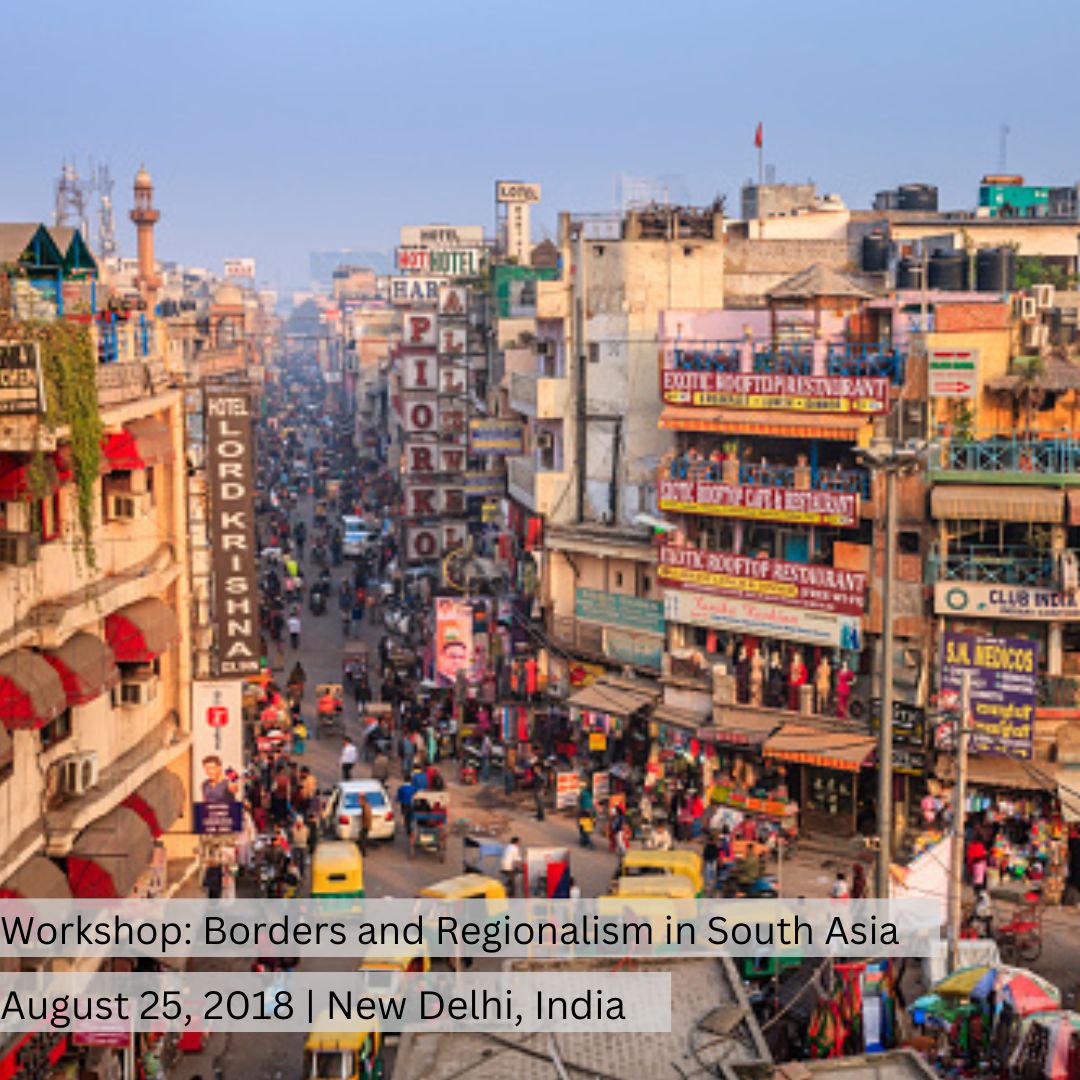
Senior Non-Resident Fellow | Hokkaido University
Naomi Chi
Naomi Chi is a Professor and Vice-Dean at the Graduate School of Public Policy (HOPS), Hokkaido University. Her area of specialization is East Asian politics, with an emphasis on migration, demographic changes, multiculturalism, gender, ethnic and sexual minorities, as well as human security in East Asia. Her latest publications include, “Museum as ‘Lieu de Memoire’: Representation of Gender in Museum Exhibitions in East Asia,”Annals on Public Policy (Vol. 18, April 2024); Naomi Chi and Edward Boyle (eds), Nihon no Kyokai: Kokka to Hitobito no Sokatsu [Japan’s Borders: Intersection of State and People](Hokkaido University Press, 2023, in Japanese); “Chapter 11: Politics of (Mis) Trust in Northeast Asia: Social Inclusion, Empathy and Reconciliation,” in Akihiro Iwashita, Yong-Chool Ha, and Edward Boyle (eds) Geopolitics of Northeast Asia (Routledge, 2022). She also served as the President of the Association for Borderlands Studies (2021-2022).

Early Career Researcher Writing Workshop
March 20–21, 2025 | Nagasaki University | Nagasaki, Japan
In collaboration with the International Research Center for Japanese Studies, the Research Center for Global Risk at Nagasaki University, and the Slavic Eurasian Research Centre and School of Public Policy at Hokkaido University, this Workshop will examine the conceptualization and operation of Japan’s borders in a regional context with the aim of developing research articles and policy papers for publication.
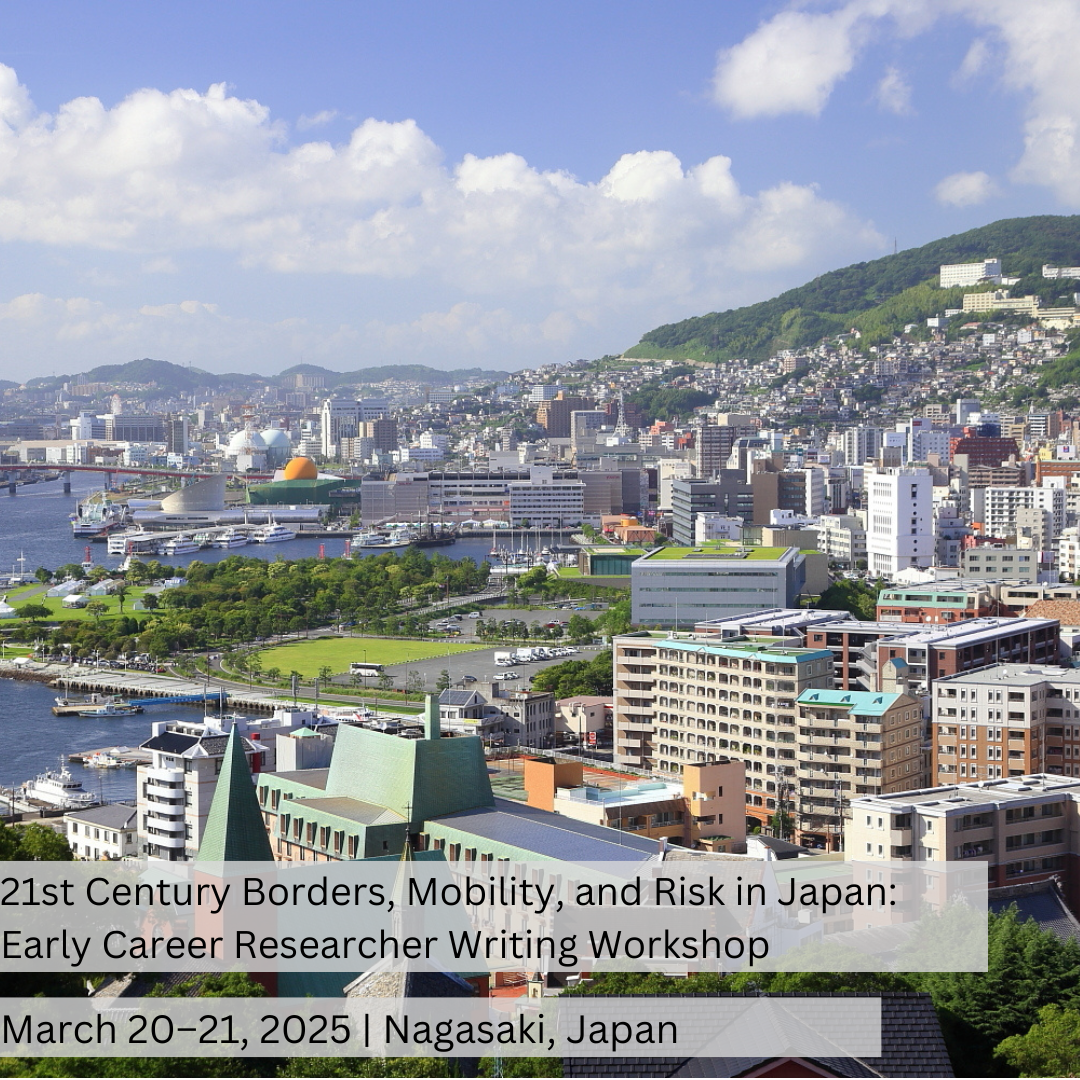
21st Century Borders in Japan — Early Career Researcher Writing Workshop
Hokkaido University, Sapporo, Japan | February 15–16, 2024
The International Research Center for Japanese Studies will be hosting an Early Career Writing Workshop titled “21st Century Borders in Japan” on February 15–16, 2024 at Hokkaido University in Sapporo, Japan. This workshop aims to develop academic articles and policy papers from early career researchers at both the graduate and postgraduate levels. More info can be found here.
21st Century Borders in Japan Writing Workshop
15 & 16 February, 9:30am–5pm
Room W302, Humanities and Social Sciences Building
Pre-Workshop Seminar
14 February, 4:30pm–6pm
“Quantifying Borders: Border Dyads and OSCE Disputes”
Prof. Emmanuel Brunet-Jailly (University of Victoria, Borders in Globalization Coordinator)
Co-Sponsored by the SRC (UBRJ/EES)
Slavic-Eurasia Research Center, Room 401 (Fourth floor)
21st Century Borders in Japan Writing Workshop
15 & 16 February
Room W302, Humanities and Social Sciences Building

#26 and #27 BIG Podcast – “Nation State Model and Creative Solutions for Border Problems”
featuring Nick Megoran, Political Geographer at Newcastle University, England
The Nation-State model is built on the synchronization between a so-called state territory and a so-called national population. The mechanical imposition of this specific model has led to serious conflicts in certain parts of the world (we will discover the ancient situation of Denmark/Germany border and the current one of Kyrgyzstan/Uzbekistan border). There have been several ways of thinking and representing the construction of this nation-state with its constituent factors, its regime of political sovereignty and territorial boundaries: community of origin, community of language, community of interests and values, cultural homogenization, elective community, common history and territorial patriotism but also imagined community. What are the consequences of this model on the design of the country’s borders? How to organize borderlands while avoiding conflicts with neighbors? With Nick Megoran, this podcast (in 2 parts) is an opportunity to talk about several original practices such as condominiums, joint development zones, territorial leasing, enclaves, the exchange of territory, statutory autonomy, free and customs zones, mobile borders, decoupling of international borders from other functional or administrative limits, juridical and economic cross-border cooperation. So many illustrations that allow us to think differently about sovereignty and state borders. Sovereignty doesn’t have to be Zero-Sum. Borders don’t have to be Walls and Barriers.
Listen to #26 (Part One): Apple Podcasts, Spotify, and YouTube.
Listen to #27 (Part Two): Apple Podcasts, Spotify, and YouTube.
Nick Megoran is a Visiting Fellow working with the Borders in Globalization program and the Centre for Global Studies and Professor of Political Geography at Newcastle University. His work focuses on nationalism and border dynamics in the Danish-German and Uzbek-Kyrgyz borderlands, which he has been researching for three decades. He has authored numerous articles and books on this topic, including Nationalism in Central Asia: A Biography of the Uzbekistan-Kyrgyzstan Boundary (Pittsburgh 2017).

